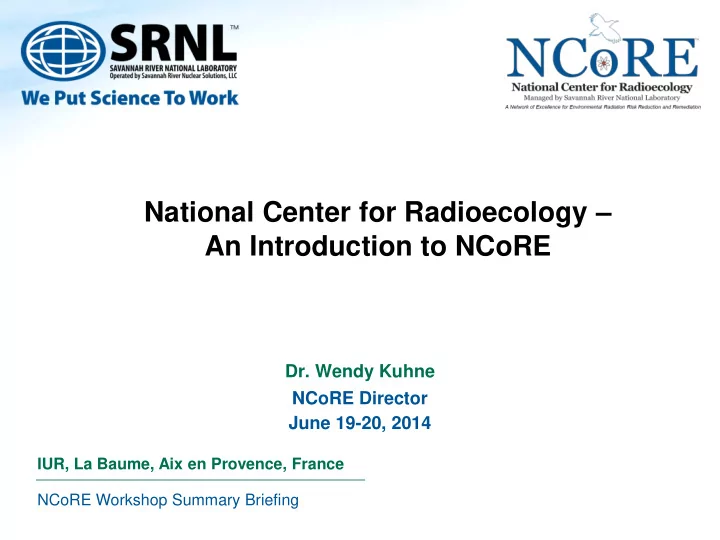

National Center for Radioecology – An Introduction to NCoRE Dr. Wendy Kuhne NCoRE Director June 19-20, 2014 IUR, La Baume, Aix en Provence, France NCoRE Workshop Summary Briefing
Outline ● Why is radioecology needed? ● Current status of programs in the U.S. ● Introduction to NCoRE ● Members of NCoRE ● Path Forward 2
Why Radioecology is Needed? As long as there is an interest in these areas there is a need for a scientific field to provide credible, consistent and defensible information that can be used for clean up activities and conducting risk assessments: ● Nuclear industry (new facility start-ups, small modular reactors development and aging reactor and other nuclear facility closures) ● Uranium mining and milling ● Emergency response ● Radioactive waste management ● Environmental releases from nuclear facilities ● Naturally occurring radionuclides in non-nuclear industries ● Education of the public about radiological risks 3
Current Status of Radioecology Programs in U.S. Research in radioecology: ● Is fragmented, with little coordination to identify national strategies and direct programs; ● Is suffering from a steadily decreasing funding base; ● Will soon be hampered by closure of key infrastructures and retirement of expertise; ● Requires training of young scientists to ensure continuation of the science 4
Establishment of National Center for Radioecology (NCoRE) ● Savannah River National Laboratory took the lead to establish the National Center for Radioecology in an effort to maintain and grow the scientific discipline and expertise in the United States. 5
Establishment of National Center for Radioecology (NCoRE) ● 2010 - Signed MOU/MOA’s with 6 Universities and 2 International Organizations ● Held an inaugural meeting with Key Partners in February 2011 6
Additional MOUs with NCoRE ● International Union of Radioecology ● McMaster University (Canada) ● Australia Nuclear Science and Technology Organization (ANSTO) 7
Recommend
More recommend